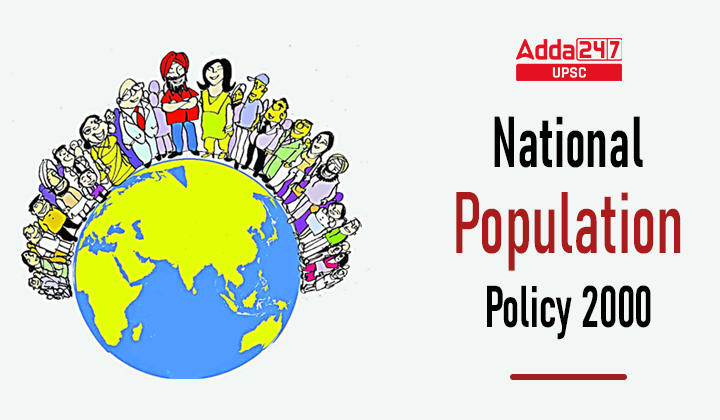Table of Contents
Key Points of National Population Policy 2000
- The first National Population Policy (NPP) was framed by the Union Ministry of Health and Family Planning in 1976.
- It suggested a wide spectrum of programmes including raising the statutory age of marriage, introducing monetary incentives, paying special attention to improving female literacy, etc.
- Introduced in 2000, NPP 2000 provided a comprehensive framework to provide the reproductive and health needs of the people of India upto 2010.
Also read: Muslim Population in India
National Population Policy 2000 Objectives of NPP
- The immediate objective of the NPP is to address the unmet needs for contraception, health care infrastructure, and health personnel.
- It also aims to provide integrated service delivery for basic reproductive and child health care.
- The medium-term objective is to bring the Total fertility Rate (TFR) to replacement levels (TFR of 2.1) by 2010, by implementing inter-sectoral operational strategies.
- The long-term objective is to achieve a stable population by 2045, at a level consistent with the requirements of sustainable economic growth, social development, and environmental protection.
National Population Policy 2000 Initiatives
Various initiatives have been taken under the National Family Planning Programme providing broad range of services mentioned as given below:
- Mission Parivar Vikas has been introduced for substantially increasing access to contraceptives and family planning services in 146 high fertility districts in 7 high focus states.
- Expanded Contraceptive Choices: The current contraceptive basket comprising of condoms, Combined oral contraceptive pills, Emergency contraceptive pills, Intrauterine contraceptive uterine device (IUCD) and Sterilization has been expanded with inclusion of new contraceptives namely Injectable contraceptive (Antara programme) and Centchroman (Chhaya).
- Compensation scheme for sterilization acceptors which provides compensation for loss of wages to the beneficiary and also to the service provider team for conducting sterilisation.
- Post-partum Intrauterine contraceptive device (PPIUCD) services are provided post-delivery.
- Scheme for Home Delivery of contraceptives by ASHAs at the doorstep of beneficiaries has been taken up.
- Scheme for provision of Pregnancy Testing Kits in the drug kits of ASHA for use in communities.
- Family Planning Logistics Management Information System (FP-LMIS): dedicated software has been launched to ensure smooth forecasting, procurement and distribution of family planning commodities across all the levels of health facilities.
National Population Policy 2000 Achievements
- The Total Fertility Rate has declined from 2.9 to 2.2 from 2005 to 2018 (SRS).
- 28 out of 36 States/UTs have already achieved the replacement level fertility of 2.1 or less.
- The Crude Birth Rate has declined from 23.8 to 20.0 from 2005 to 2018 (SRS).
- India’s Wanted Fertility Rate has come down to 1.8 in NFHS IV from 1.9 in NFHS III.
What is the Population Control Bill?
-
- The Population Control Bill of 2019, which was withdrawn in 2022, proposed a two-child policy per couple and aimed to incentivise its adoption through educational benefits, free healthcare, better employment opportunities, home loans, and tax cuts.


 TSPSC Group 1 Question Paper 2024, Downl...
TSPSC Group 1 Question Paper 2024, Downl...
 TSPSC Group 1 Answer key 2024 Out, Downl...
TSPSC Group 1 Answer key 2024 Out, Downl...
 Cabinet Ministers of India 2024, New Cab...
Cabinet Ministers of India 2024, New Cab...







